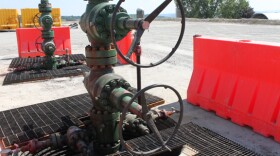As hydrofracking lands back on the front page, a question about testing water for contamination landed in the Innovation Trail inbox. One of our readers writes:
We just bought a house and have our own well. What is the best way to have the water tested to allow us to have a complete base line for our well so if and when gas drilling begins and our water becomes contaminated we know what we had prior to the drilling? Also where do you find someone to test the water and what should we ask them to test for?
Luckily, we have answers, thanks to a well-attended workshop offered by Penn State's Cooperative Extension late this summer. In Pennsylvania, where drilling is underway in the Marcellus Shale, almost a million households are served by private water supplies, which include wells and springs; and these are most often found in the sorts of rural areas where drilling is taking place. So the Extension recommends the following steps to test your water prior to drilling:
1. Let the gas company test your water before drilling begins. If your water supply is within 1,000 feet of a proposed gas well site, any driller will probably arrange have your water tested by an accredited facility. Do NOT refuse that test, as drillers will not be presumed responsible for contaminating water supplies to which they were denied access before drilling began. Request the name and company affiliation of the person who collects your water sample and what tests will be performed. Also make sure you ask to receive results from the water laboratory or energy company.
2. Conduct other testing as required with a state-certified water testing laboratory. If your water supply is beyond 1,000 feet or you would like a second opinion, you can have your well tested at your expense. New York's Department of Environmental Conservation says residents should consider testing within 1 mile of drilling. Testing should be done by a lab found on the list of facilities certified by New York State. Your lab should be able to help you identify contaminants that could change with drilling, such as methane, or coliform bacteria. Possible contaminants are listed in more detail in a very thorough Extension publication on water testing. Pay the extra money to have your water sample collected by a professional.
3. Read your results. Penn Coop Extension has a slew of good documents on reading and interpreting your water test results. A second test in the months after drilling (Cornell Extension discusses when to test), can be compared to your initial findings.
Extension representatives street that good well maintenance never goes out of fashion, as everything from a car parked to close to mice living in your well shaft can cause serious contamination. They recommend that you put in the time to get your well tested and serviced regularly.
Below, Brian Swistock, who led the workshop, has some interesting things to say about fielding increasing numbers of questions in the past two years from Pennsylvanians concerned about their water tests and also about how often he sees actual problems.
http://stream.publicbroadcasting.net/production/mp3/national/local-national-934226.mp3
Have a question for an Innovation Trail Guide? Email us at innovationtrail [at] wxxi [dot] org, and we might put the answer to your question on the website.





